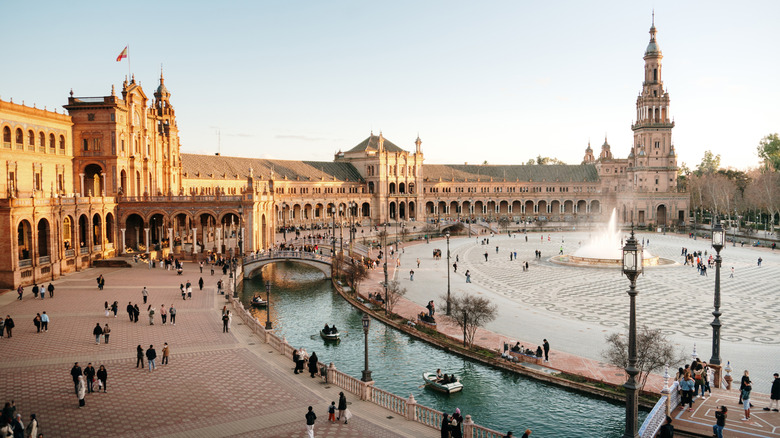The Unexpected Gesture You Should Avoid Making In Southern Spain, Per Rick Steves
Travel expert Rick Steves doesn't have much good to say about southern Spain. In fact, he's repeatedly denounced the Costa del Sol, telling travelers to skip this popular Spanish coastline due to "ridiculous prices" and crowds. But that's not all — the rules of etiquette can be confusing down there, too. In fact, according to Steves, one common hand signal — the cheek screw, used to indicate praise in Italy — can be interpreted as downright mocking among the more masculine Andalusians.
An Italian nonna may screw her index finger into her cheek as a non-verbal demand that loved ones keep stuffing themselves with the delicious meal she's prepared, and you might find it adorable when her grandchild repeats the same gesture back to indicate that grandma's spaghetti is "buono." Italians are known for their bodily expressive communication, and you may think it's fun to try and include some of their more common gestures while traveling — it's certainly easier than trying to learn a second language! As noted on Steves' travel site, "The cheek screw is used widely and almost exclusively in Italy to mean good, lovely, beautiful, or delicious."
But just like verbal language, gestures don't always translate well. For instance, a friendly American wave should be avoided at all costs in Greece for fear of being taken as an insult. "Be careful," Steves warns. "In southern Spain, the cheek screw is used to call a man effeminate." Rather than think you're complimenting his food, a chef might understand you to be calling him a "lovely piece of meat." Grandma's plea to a growing young boy could be read by a Spaniard as saying that he looks weak and needs more to eat.
Common Spanish gestures that are safe to use instead
While the cheek screw or "buono" gesture is decidedly out in Spain, there are plenty of other non-verbal signals you can use that the country smiles upon. The "chef's kiss" — made by pinching the fingertips of one hand together and bringing them to your lips to kiss at before they bounce back into the air — indicates high praise here, just as it does in most of Europe. However, Rick Steves suggests that you "make it subtle," like a sensual licking of the fingertips. Similar to how you should think twice before smiling in Russia, too much enthusiasm here can make you look stupid.
Steves says you're also safe using the "hand purse," made by pulling the fingers of one hand together above the palm, almost as if you're holding a drawstring purse full of coins. In Spain, doing this means the same as saying "a lot," as in "a full and heavy bag." (Just be careful doing this one in Italy, where the same gesture can mean "You fool!" or "What are you doing?")
A third gesture — a safe bet that pretty much means the same thing universally — is the eyelid pull, where you pull your bottom eyelid downward. Steves says Spaniards use it as a warning amongst each other when someone seems suspicious. If someone does this to you, keep your eyes peeled for pickpockets or con-artists that may be in the area. In return, you can offer them a smile and a nod — the universal gesture of "gracias."

